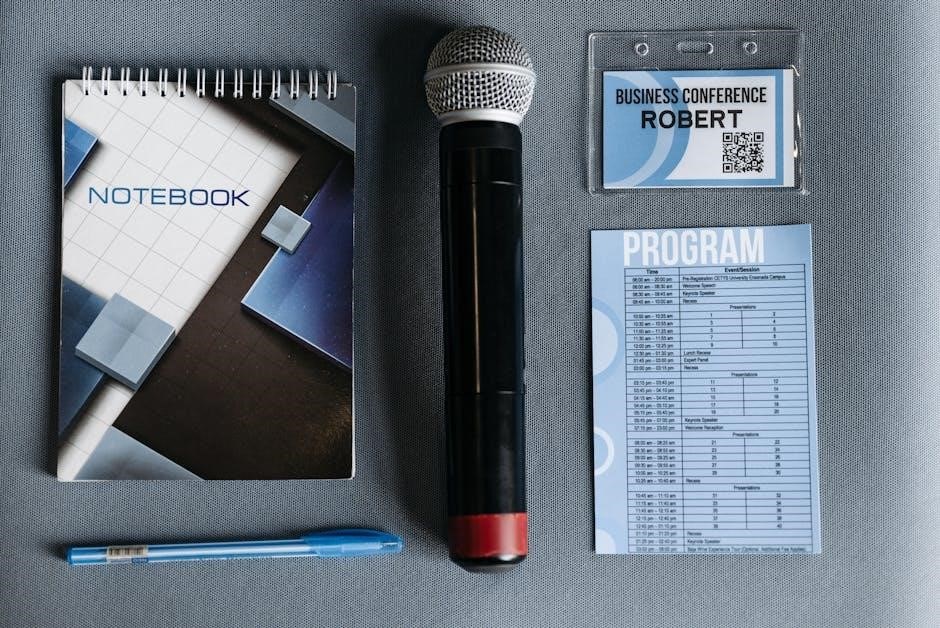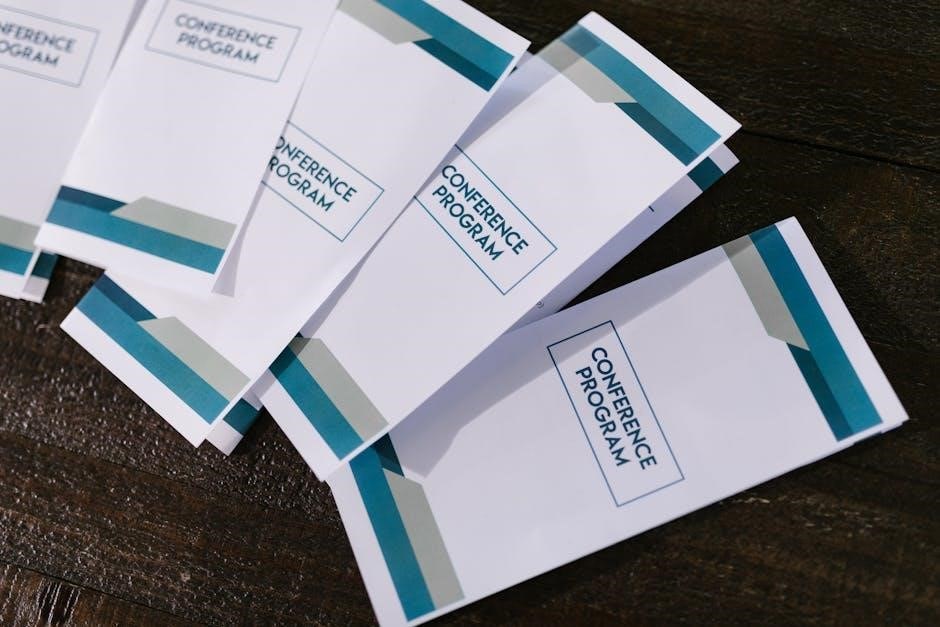event planning questionnaire pdf
Download the essential event planning questionnaire PDF. Perfect for organizers, get tips, templates, and more to plan your event seamlessly.
An event planning questionnaire is a vital tool for gathering detailed information to ensure successful event execution. It helps organizers understand client needs, preferences, and objectives, providing a clear roadmap for planning. With templates like the FREE 13 Sample Event Planning Checklists in PDF, planners can streamline the process, ensuring all aspects are covered efficiently.
1.1 What is an Event Planning Questionnaire?
An event planning questionnaire is a structured document designed to collect essential information for organizing successful events. It typically includes questions about event type, date, venue, budget, attendees, and preferences. These tools help planners understand client needs, set clear objectives, and ensure all details are addressed. With templates like the FREE 13 Sample Event Planning Checklists in PDF, organizers can efficiently gather data, streamline communication, and create tailored event strategies. It’s a customizable resource for effective event management.
1.2 Importance of Using a Questionnaire in Event Planning
A questionnaire is essential for effective event planning as it serves as a foundation for understanding client needs, preferences, and objectives. It ensures all details are addressed, streamlines communication, and reduces misunderstandings. By using tools like the FREE 13 Sample Event Planning Checklists in PDF, planners can gather critical information efficiently, allowing them to create tailored strategies and deliver successful events. It’s a cornerstone for organized, client-focused, and stress-free event management.
Purpose of an Event Planning Questionnaire
The purpose of an event planning questionnaire is to gather essential details, understand client preferences, and identify objectives, ensuring a well-organized and tailored event execution.
2.1 Gathering Event Details
Gathering event details is crucial for effective planning. A questionnaire helps collect information such as event type, date, venue, attendance, and timing. It ensures clarity on logistics, catering, and equipment needs. By asking about themes, decorations, and entertainment preferences, planners can tailor the event to meet expectations. Additionally, it outlines responsibilities, ensuring all tasks are assigned and tracked. This step is essential for creating a detailed checklist and timeline, guaranteeing a smooth execution.
2.2 Understanding Client Preferences
An event planning questionnaire helps uncover client preferences, ensuring alignment with their vision. It explores catering choices, theme ideas, entertainment options, and vendor selections. By asking about audience demographics and desired outcomes, planners can tailor experiences to meet expectations. Understanding client priorities, such as budget allocation or sustainability goals, ensures the event reflects their values. This insights-driven approach fosters creativity and satisfaction, making the event memorable and impactful for all stakeholders involved.
2.3 Identifying Event Objectives
An event planning questionnaire is crucial for pinpointing the purpose and goals of an event. It helps clarify whether the event aims to celebrate, educate, network, or achieve specific business outcomes. By asking about desired outcomes, questionnaires ensure alignment with the client’s vision. For instance, understanding if the event is a milestone celebration or a fundraising initiative shapes decisions on content, activities, and measurements of success. This clarity guarantees the event strategy is purpose-driven and impactful.
Designing an Effective Event Planning Questionnaire
Designing an effective event planning questionnaire involves a clear structure and concise questions. Utilize templates like the FREE 13 Sample Event Planning Checklists in PDF for streamlined planning.
3.1 Key Elements to Include
An effective event planning questionnaire should include essential elements like event basics, budget details, logistics, and vendor requirements. It should also cover client preferences, objectives, and timelines. Incorporating these elements ensures comprehensive planning and alignment with client expectations. Tools like PDF templates, such as the FREE 13 Sample Event Planning Checklists, provide structured formats to streamline the process. Customization options allow planners to tailor questions to specific event types, ensuring relevance and clarity for seamless execution.
3.2 Tips for Creating a Comprehensive Questionnaire
Start with clear, concise questions to avoid confusion. Organize questions logically, beginning with basic details and progressing to specifics. Use a mix of question types, such as multiple-choice and open-ended, to gather both quantitative and qualitative data. Ensure the questionnaire is visually appealing and easy to navigate. Include examples or templates, like the FREE 13 Sample Event Planning Checklists, to save time and ensure thoroughness. Regularly test and refine the questionnaire for clarity and relevance.
3.3 Common Mistakes to Avoid
One common mistake is neglecting to use templates like the FREE 13 Sample Event Planning Checklists, leading to overlooked details. Another error is omitting key sections, such as budget or logistics, which are crucial for event success. Additionally, including overly complex or irrelevant questions can confuse respondents. Failing to test the questionnaire for clarity and length is another pitfall. Ensure questions are concise, relevant, and logically organized to avoid frustration and ensure accurate data collection.

Essential Questions for an Event Planning Questionnaire
Include event basics, budget details, and logistics to ensure comprehensive planning. Questions should cover objectives, preferences, and vendor requirements, as outlined in FREE 13 Sample Event Planning Checklists.
4.1 Event Basics
Event basics form the foundation of your questionnaire. Start by asking for the event type, date, time, and location. Inquire about the expected number of attendees and duration. Determine if there are any specific themes or formats, such as virtual or hybrid events. These details help establish a clear framework for further planning. Use templates like the FREE 13 Sample Event Planning Checklists to ensure all fundamental aspects are covered, providing a solid starting point for successful event organization.
4.2 Budget and Financial Details
Budget and financial details are crucial for effective event planning. Include questions about the total budget, allocations for venue, catering, and entertainment. Ask about payment terms, expected expenses, and any financial constraints. Inquire if there are sponsors or funding sources. These details ensure resources are utilized efficiently and align with client expectations. Tools like checklists and PDF templates help organize financial data, making it easier to track and manage expenditures throughout the planning process.
4.3 Logistics and Vendor Requirements
Logistics and vendor requirements are essential for smooth event execution. Include questions about venue setup, parking, and catering needs. Ask for vendor preferences, delivery timelines, and equipment requirements. Inquire about vendor contracts, arrival times, and setup details. Also, gather information on dietary restrictions and special requests. These logistics ensure all vendors align with the event vision and timeline, avoiding last-minute issues. Detailed checklists help organizers manage vendor coordination effectively.

Tools for Creating an Event Planning Questionnaire
Utilize tools like Google Forms, Typeform, or JotForm to create digital questionnaires. PDF templates are also ideal for structured, printable formats. These tools offer customization, real-time data collection, and analysis features, streamlining the planning process and ensuring all event details are captured efficiently.
5.1 PDF Templates
PDF templates are a popular choice for creating structured and professional event planning questionnaires. They offer a clean, printable format that can be easily shared and completed offline. Many free templates, such as the FREE 13 Sample Event Planning Checklists, are available online, providing customizable fields for event details, budgets, and logistics. PDFs are ideal for clients who prefer a traditional, tangible format, ensuring clarity and organization in the planning process. They can be edited using tools like Adobe Acrobat or Google Docs, making them versatile for various event types.
5.2 Online Survey Platforms
Online survey platforms like Google Forms, Typeform, and SurveyMonkey are excellent tools for creating and distributing event planning questionnaires. They offer customizable templates, real-time responses, and data analysis features. These platforms are ideal for reaching a wide audience, ensuring quick feedback, and streamlining the planning process. They also allow for easy sharing via email or social media, making it convenient for clients to provide detailed information. This digital approach enhances efficiency and collaboration in event planning.
Best Practices for Using a Questionnaire
Ensure clarity and relevance in questions, keep it concise, and use digital tools for easy distribution. Regularly review and update based on client feedback and event trends.
6.1 Ensuring Clarity and Relevance
Clarity and relevance are crucial for effective questionnaires. Use straightforward language and avoid ambiguity to ensure clients understand each question. Tailor questions to specific event types, such as weddings or corporate events, to gather targeted information. This approach helps in identifying client priorities and preferences accurately, enabling planners to deliver personalized solutions. Regularly updating the questionnaire based on feedback ensures it remains relevant and effective for diverse event needs.
6.2 Customizing for Different Event Types
Customizing questionnaires for specific event types ensures relevance and accuracy. For weddings, focus on themes, guest lists, and catering preferences. Corporate events may require questions on branding, attendance goals, and technology needs. Tailoring questions to the event type helps gather precise information, enabling planners to address unique requirements effectively. Using templates like the FREE 13 Sample Event Planning Checklists in PDF can provide a solid foundation for customization, ensuring no detail is overlooked.
Analyzing Responses
Analyzing responses from event planning questionnaires involves reviewing feedback to identify key trends and preferences, ensuring all client needs are met effectively for a successful event.
7.1 Interpreting Feedback
Interpreting feedback from event planning questionnaires involves carefully reviewing responses to identify trends, preferences, and areas for improvement. This step ensures that all client needs and expectations are met. By analyzing the data, planners can make informed decisions to refine event details, such as logistics, vendors, and activities. Effective interpretation also helps in addressing potential challenges early, ensuring a smooth and successful event execution. Accurate feedback analysis is crucial for delivering a memorable and satisfying experience for attendees.
7.2 Making Data-Driven Decisions

Making data-driven decisions involves using feedback from event planning questionnaires to guide strategic choices. By analyzing trends, preferences, and patterns in responses, planners can allocate resources effectively, select suitable vendors, and tailor activities to meet attendee expectations. This approach ensures that decisions are grounded in actionable insights, leading to better outcomes. Utilizing tools like PDF templates for organizing data can further streamline the process, enabling planners to create events that align with client goals and attendee satisfaction.
Case Studies
Case studies highlight real-world applications of event planning questionnaires, showcasing their effectiveness in organizing successful events. They demonstrate how data collection leads to improved planning and execution.

8.1 Successful Events Planned Using Questionnaires
Event planning questionnaires have been instrumental in organizing successful events, from corporate conferences to community gatherings. For instance, a hackathon planning document outlines how questionnaires helped gather essential details, ensuring seamless execution. Similarly, a wedding planning checklist template in PDF format was used to tailor events to clients’ preferences. By leveraging such tools, organizers can align event goals with attendee expectations, fostering memorable experiences and achieving desired outcomes effectively.

Common Challenges
Low response rates and unclear questions are common challenges. Ensuring clarity and relevance is crucial to avoid confusion and incomplete data, impacting effective event planning decisions.
9.1 Overcoming Low Response Rates

To address low response rates, personalize your approach by clearly communicating the questionnaire’s purpose and benefits. Ensure questions are concise and relevant, making it easy for participants to engage. Offering incentives, such as exclusive event updates or discounts, can motivate responses. Additionally, consider sending polite reminders and optimizing the questionnaire’s accessibility across devices. These strategies help maximize participation and gather valuable insights for effective event planning.

Future Trends
Future trends include integrating event planning questionnaires with advanced technologies like AI and real-time analytics for dynamic data collection and smarter decision-making processes.
10.1 Integration with Technology
Integrating event planning questionnaires with technology enhances efficiency and accuracy. Tools like AI-powered platforms analyze responses in real-time, providing actionable insights. Automated workflows streamline data collection, reducing manual efforts and errors. Additionally, interactive PDF templates and cloud-based systems enable seamless collaboration and instant updates. This integration not only improves decision-making but also offers scalability for large-scale events. As technology evolves, questionnaire integration will become even more sophisticated, ensuring better event outcomes and client satisfaction.
An event planning questionnaire is an essential tool for streamlining the planning process. It ensures clarity, alignment with objectives, and enhances overall event outcomes, making it indispensable for organizers.
11.1 Summary of Key Points
An event planning questionnaire is a crucial tool for organizing successful events, ensuring clarity and alignment with client objectives. It streamlines the planning process by gathering essential details, from event basics to logistics. Utilizing templates, such as the FREE 13 Sample Event Planning Checklists in PDF, can enhance efficiency. Regularly reviewing and adapting questionnaires based on feedback ensures they remain effective and relevant, ultimately contributing to the delivery of memorable and well-organized events for all stakeholders involved.

